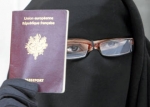 In a very cruel, unfair and misleading editorial, the New York Times criticized the French will to ban the Burqa in the streets (one should say the Niqab: full radical muslim face-covering veil). This editorial was published on January 26, 2010.
In a very cruel, unfair and misleading editorial, the New York Times criticized the French will to ban the Burqa in the streets (one should say the Niqab: full radical muslim face-covering veil). This editorial was published on January 26, 2010.
The title was: "The Taliban would applaud" (sic).
The New York Times's point was: France is as intolerant as the Taliban. The first oblige women not to wear the full scarf, while the second oblige women to wear it.
However, considered from France, things are slighly more complicated than that.
First, it is wrong to consider as similar options to oblige women to wear the full veil or to oblige women not to wear it. We should compare comparable things.
Nobody would say that democracies are as bad as the worst dictatorships, because they oblige kids to go to school, while the worst dictatorships oblige kids NOT to go to school.
It is the same with the Burqa. Wearing the full black face-covering veil is against basic women's freedom, period.
So, even if it is controversial, and understandingly so, banning the burqa in the streets should not be interpreted like acting as Western talibans.
It has nothing to do either with being anti-muslim per se (stating that standard face-covering veils for women are the symbol of islam is an insult to islam).
Come on Americans! You can be much smarter than that!
In order to put some light in this debate, please read this interview (Globe and Mail, Sunday, Jul. 11, 2010)..
It was released yesterday by the Globe and Mail (a Canadian newspaper). Philippe Portier is a great French scholar, the most reliable regarding the study of French secularism (laïcité). Professor at Sorbonne University (EPHE), he is also leading the GSRL, the biggest French team working on religion and secularism from a social science point of view.
One of Portier's multiple strengths is that he does not shape his analyzis from preconceived ideologies, while being always sharp and clear on the theoretical level.
In my view, Philippe Portier's interview, although very short, is an excellent explanation of the French position regarding the ban on Burqa in the French streets.
